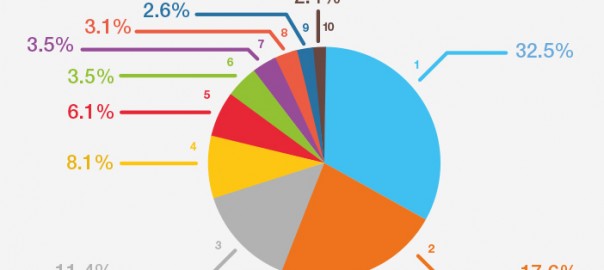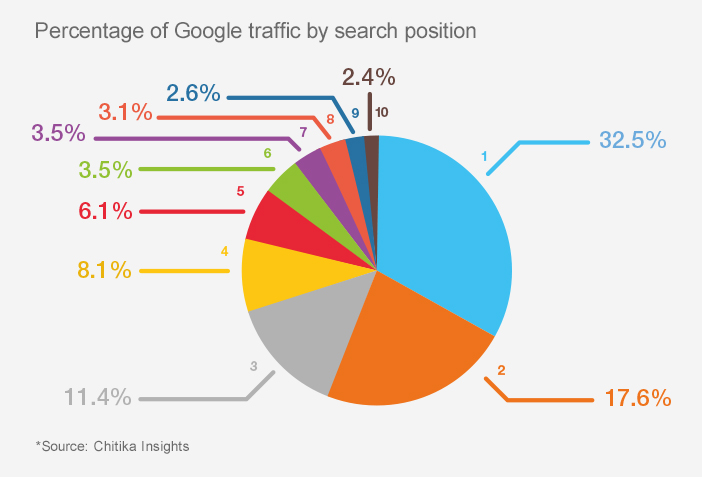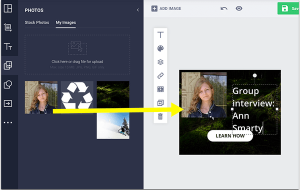They say three things matter in real estate: location, location, location. The same is true of digital real estate—being in the right locations dramatically increases your exposure to your target audience, helping you attract new customers and drive sales. In today’s world, ranking well in search results can be more effective than having a storefront in the heart of downtown, exposing huge numbers of consumers to your business and your brand. That’s why search engine optimization (SEO) is such an important part of many businesses’ branding strategies.
A Google search can return hundreds, thousands, or even millions of sites—but the average user usually only looks at the results on the first page. In fact, over 90% of the traffic from the average Google search goes to the 10 results on its first page, especially those on top (as the pie chart below shows). When consumers search for your business, you want your website and your other assets (for instance, social media pages and reviews) to fill that page. This kind of power—what experts call “first-page domination”—lets you control the digital content most associated with your business, helping you build your brand online.
Here are four ways to dominate that first page of search results:
1. USE YOUR WEBSITE TO PROMOTE YOUR BRAND
Your website truly is the front door of your business. Since you’re in (almost) complete control of its content and design, it can be one of your strongest tools for promoting your brand. For many businesses’ websites, the main challenge is attracting visitors. You’ll want to give your site a good shot at generating serious web traffic, hopefully making it appear in search results ahead of competitors’ websites, third-party reviews, and other content that you don’t own.
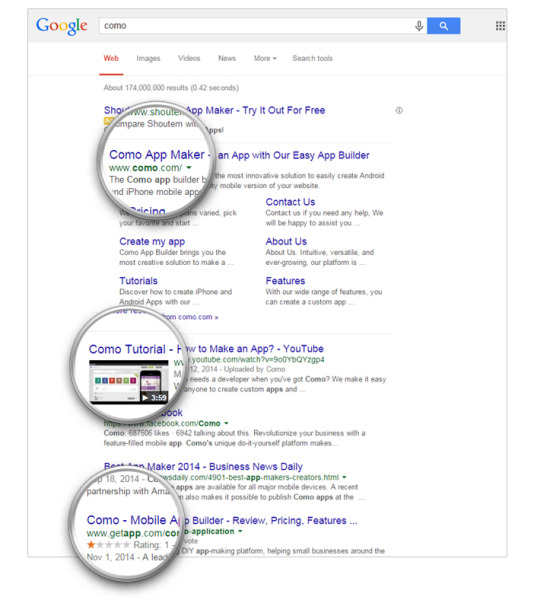
Here are a few ways to optimize your website to appear prominently on Google’s first page of results for your business name:
- Try to make your website’s domain contain the name of your business. You can check out GoDaddy.com for available options. If you can’t get your business’ exact name as your domain name, stay as close to it as possible. Also take a look at WhoIs.com to find out who owns the domain you want and try purchasing it from them.
- Make sure your logo appears in the same position on every page of your website to make Google notice it. In addition, since images aren’t exactly searchable, you’ll want to let the search engines know what your logo means. You or your webmaster can do this by completing the alt field for your logo image.
- Make sure your website’s heading contains your business’ name. Also, to maximize its visibility to Google, you or your webmaster should label it with the H1 HTML tag.
- On your website’s main menu, include links to your major subpages. This will help Google identify these subpages, giving them a better chance of appearing on Google’s first page of results.
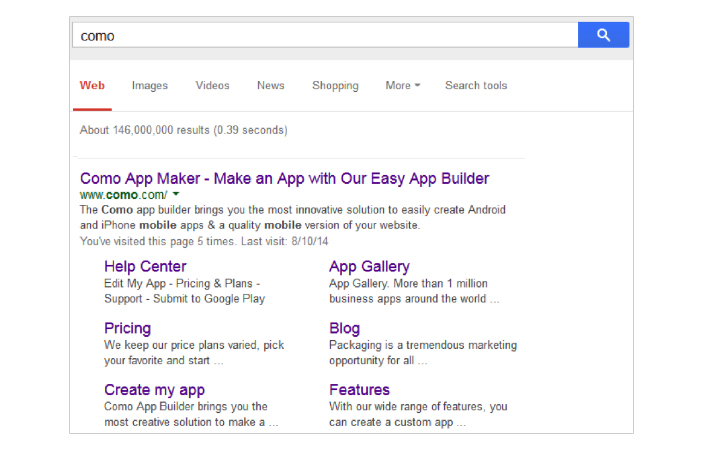
2. BE BIG ON SOCIAL MEDIA
Each social media page you have is an opportunity for you to promote your brand and increase your visibility in search results. For starters, you’ll want to be on Facebook, Twitter, and—depending on your business—Instagram. You’ll also want to have pages on both YouTube and Google+, as both of these platforms are parts of the Google empire and can have a powerful impact on your search rankings. And if you can support a blog, you should definitely open one.
To boost your social media presence push in search results, you’ll want to let Google know these pages have the same owner as your website. Here are some ways to optimize each of your social media profile pages for first-page domination:
- Include your web address in the appropriate profile field.
- Complete the section covering your basic details, clearly and succinctly explaining what your business does.
- Link to your other social pages.
- Add links to let visitors download your app from the various app stores.
You’ll also want to link to each of your social media pages from your website’s footer. And when it comes to YouTube, you can use the titles and descriptions of individual videos to raise your search rankings, as these are another opportunity for Google to index information about your business. Make sure to frequently include your business name in these fields.
3. GO LOCAL
Google knows that consumers tend to look for businesses such as restaurants or salons that are near their home or office, and it tries to offer more relevant results by factoring in locality. This is important to remember when trying to attract customers, especially for small businesses with localized clientele. To promote your business on Google and drive in-store sales, you’ll want to provide information that will help draw nearby searchers to your website.
One quick way to make it easy for prospective customers in your area to find you is by signing up for Google My Business, which lets users see your business’ location on a map with contact details.
4. USE YOUR APP
In addition to being an effective way to reach customers, a mobile app can help you with first-page domination. How? When your app gets onto one of the stores, it gets a landing page within the store. Google indexes these pages, factoring them into search rankings. That means the more app downloads you get, the more your app can help you with first-page domination—so start thinking about optimizing your app to get discovered in the app stores.
To make all those downloads boost your app’s search ranking, you’ll want to make sure Google knows the app is really yours. Here are some ways to make that happen:
- Give your app a name identical or similar to the name of your business, without making it too long (try to keep it under 12 characters).
- Mention your business name at least once—but preferably a few times—in the app description. Make sure it sounds natural and not forced.
- Encourage reviews and ratings of your app users in the store. (The more you have, the higher you’ll rank.)
- Add a landing page for your app to your website. It should describe your app’s functionality and have links to your app’s pages on the various app stores. You’ll want to link to this landing page from a number of places on your main website, including its footer.
Steps like these can make a real difference in attracting new customers and building your brand through first-page domination. Remember: Search engine optimization and branding aren’t games that are easily won overnight, but if you keep investing in raising your rankings in the search engines—especially Google—you’re likely to see worthwhile returns. When your business is firmly in control of the first page of search results for its name, you’ll have some of the best business real estate the Internet has to offer.
What does your business do to dominate relevant search results? Tell us in the comments below or tweet us @ComoMobile!
Digital & Social Articles on Business 2 Community
(359)
Report Post